Migrant crisis: Pope Francis tells Lesbos camp 'you are not alone'
- Published
Pope Francis blesses a girl in the Lesbos migrant camp
Pope Francis has made an emotional visit to a detention camp on the Greek island of Lesbos, telling the migrants there "you are not alone".
The Moria camp holds more than 3,000 people, some of whom may face deportation to Turkey.
"Do not lose hope," the Pope said, as he urged the world to show "common humanity" on the migrant crisis.
Thousands of migrants are now stuck on Lesbos after last month's EU-Turkey deal to try to ease the flow.
The Vatican insists that the Pope's visit is purely humanitarian and religious in nature and should not be seen as a criticism of the deportations.
Dozens of refugees lined up in the Moria camp to see the Pope, some holding banners asking for help.
Pope Francis first met a group of young boys who had made the dangerous overseas journey alone. As he toured the camp, TV pictures showed one woman kneeling at his feet, delivering an emotional appeal.
A young girl handed him some artwork. The Pope said "Bravo, Bravo", before telling his staff: "Don't fold it. I want it on my desk."
In his speech, the Pope acknowledged "the great sacrifice" the people in the camp had made, saying he wanted to "draw the attention of the world to this grave humanitarian crisis".
He told the camp's residents: "Do not lose hope. The greatest gift we can offer to one another is love."
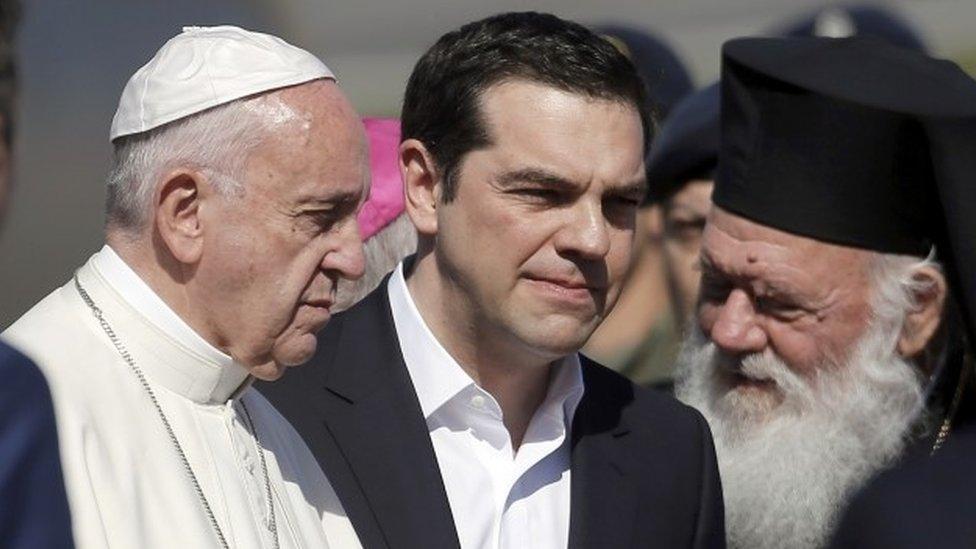
Pope Francis was met by PM Alexis Tsipras (C) and Archbishop of Athens Ieronimos II
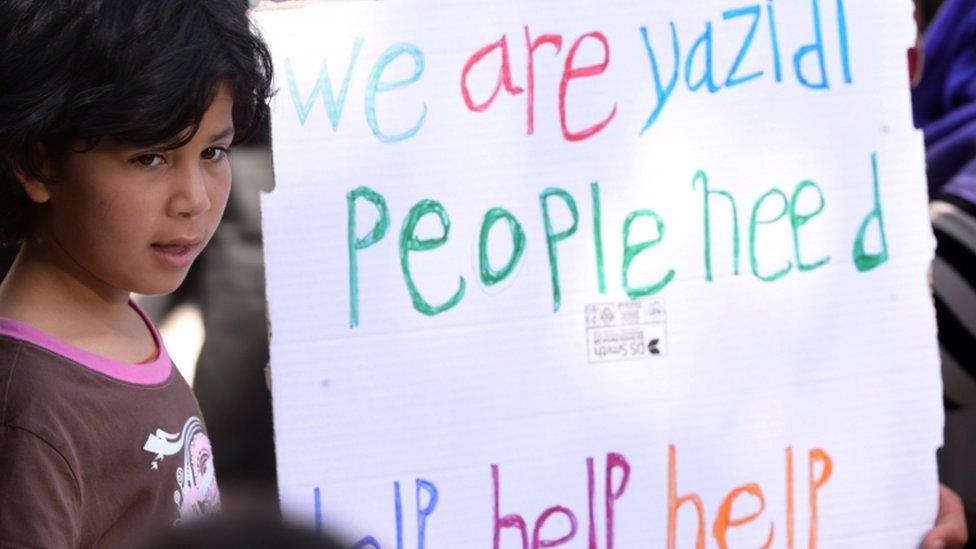
A girl at the Moria camp prepares a poster for the Pope's visit
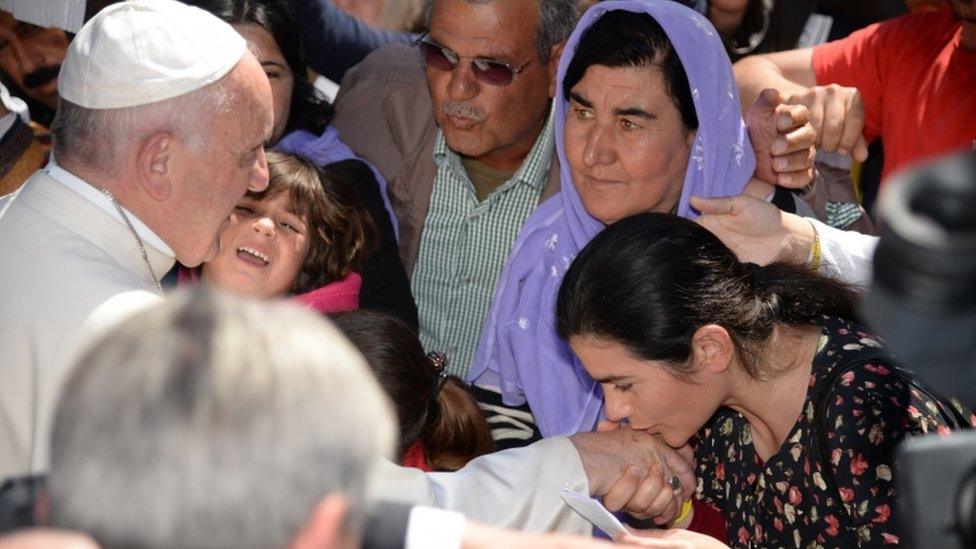
Do not lose hope, the Pope told the camp's residents
On his plane journey to Lesbos, the Pope told reporters: "This is a voyage marked by sadness... We will witness the worst humanitarian disaster since the Second World War.
"We will see so many people who are suffering, who are fleeing and do not know where to go. And we are also going to a cemetery, the sea. So many people never arrived."
The Pope was met at Lesbos Mytilene airport by Greek Prime Minister Alexis Tsipras, Patriarch Bartholomew, the spiritual head of the world's Orthodox Christians, and Archbishop of Athens Ieronimos II.
In his speech at the camp, Patriarch Bartholomew told the residents: "The world has not forgotten you. The world will be judged by the way it has treated you."
The three religious leaders then signed a declaration urging the international community to protect human lives and extend temporary asylum to those in need.
In another address on the seafront, Pope Francis said migrants were not numbers but people with "faces, names and individual stories".
The three leaders then prayed for all those who had lost their lives in sea crossings, followed by a minute's silence and the laying of wreaths in the sea.

'God willing, he'll help' - BBC's Caroline Hawley on Lesbos
It was desperation, not fervour, that brought the small groups of Muslim migrants we met out on to the road to try to get a glimpse of Pope Francis.
One Syrian Kurdish family were petrified of being sent back to Turkey. "We risked our lives to get out and we'd rather die here," the father said, holding his toddler. "God willing, he'll help us and get Europe to open its doors to us."
Another Syrian woman - from Raqqa - had arrived before the EU-Turkey deal came into force, while her son had landed on a neighbouring Greek island after the agreement.
She told me she was praying the Pope could somehow find a way to reunite her family. Hala Abdullah is likely to be disappointed. The Pope has come to Lesbos to try to stir Europe's conscience. But his strong moral message won't translate into a solution.

Greece's ERT state television reported that Pope Francis had offered to take 10 refugees back to Italy with him. Vatican spokesman Rev Federico Lombardi said he could not comment.
In September, the Pope made space in the Vatican apartments for two refugee families, urging Catholics across Europe to play their part to resolve the crisis.
Migrant arrivals in Greece have fallen significantly this year, following the closure of borders and the announcement of the EU-Turkey deal.
In the week to 13 April, arrivals in Greece were 76% lower, external than the previous week, the International Organization for Migration said.
Pope Francis visited the Italian island of Lampedusa in 2013 to show similar support for migrants after dozens died trying to reach it.
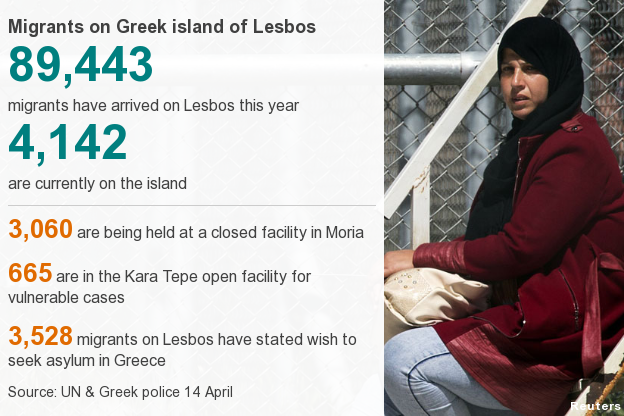
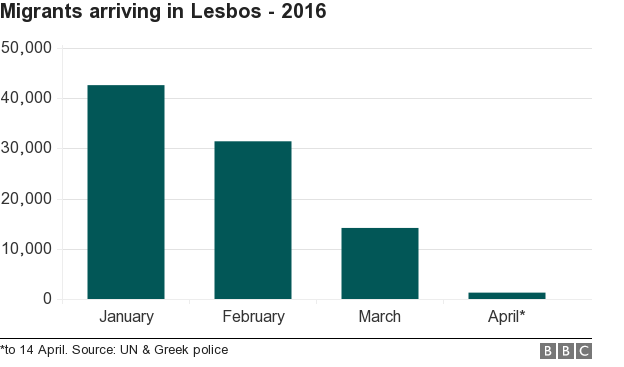

Key points from EU-Turkey agreement
Returns: All "irregular migrants" crossing from Turkey into Greece from 20 March will be sent back. Each arrival will be individually assessed by the Greek authorities
One-for-one: For each Syrian returned to Turkey, a Syrian migrant will be resettled in the EU. Priority will be given to those who have not tried to illegally enter the EU and the number is capped at 72,000
Visa restrictions: Turkish nationals should have access to the Schengen passport-free zone by June. This will not apply to non-Schengen countries like Britain
Financial aid: The EU is to speed up the allocation of €3bn ($3.3 bn; £2.3 bn) in aid to Turkey to help migrants
Turkey EU membership: Both sides agreed to "re-energise" Turkey's bid to join the European bloc, with talks due by July

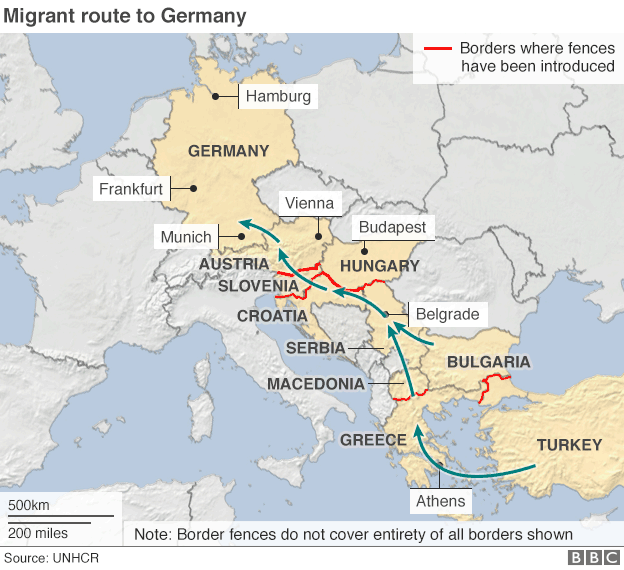

A note on terminology: The BBC uses the term migrant to refer to all people on the move who have yet to complete the legal process of claiming asylum. This group includes people fleeing war-torn countries such as Syria, who are likely to be granted refugee status, as well as people who are seeking jobs and better lives, who governments are likely to rule are economic migrants.